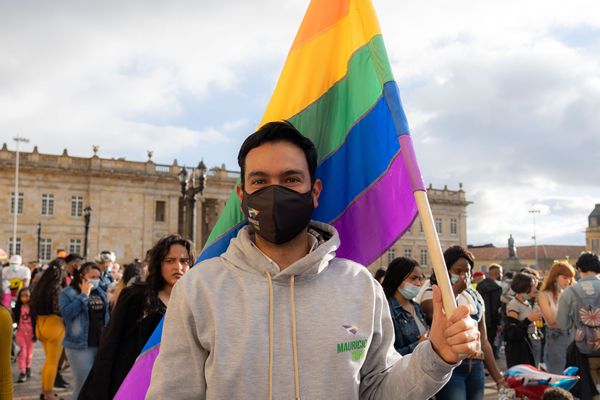
BOGOTÁ, Colombia — The first openly gay man elected to Colombia’s congress says he plans to run for a second term in 2022.
“I think that I will be re-elected to the House of Representatives,” Congressman Mauricio Toro told the Washington Blade on Sept. 21 during a Zoom interview from Bogotá, the Colombian capital.
Toro, 38, is a member of the Green Alliance, a center-left party known as “Alianza Verde” in Spanish.
Voters elected him in 2018. Colombian Sen. Angélica Lozano, a bisexual Colombian senator and Green Alliance member who is married to Bogotá Mayor Claudia López, is the only other openly LGBTQ person in the Congress.
Toro after his election told the Blade his agenda “is not only an agenda for the LGBTI community.” He reiterated that point on Sept. 21.
“The needs of the LGBTI community are not only the guarantee that we have the same rights as any other Colombian,” said Toro. “[They are] the right to a dignified and quality job, the right to financing of higher education, the right to a health care system that provides us with quality care, the right to social protest, the right to enjoy a healthy environment and the right today to have and to create a business and generate jobs.”
Toro told the Blade the main pillars of his platform remain entrepreneurship “as a model of economic development,” more funding for Colombia’s public education system, innovation and increased access to technology. Toro stressed LGBTQ Colombians — along with everyone else in the country — will benefit from this agenda.
“We started with those elements from the base,” he said. “We said well, as a community we also want the same as any Colombian in addition to reinforcing our rights.”
Congress not responsible for LGBTQ rights advances
Colombia is among the Latin American countries in which same-sex couples can legally marry. Transgender people are also able to legally change their name and gender on identification cards and other government documents without surgery.
Then-President Juan Manuel Santos and the Revolutionary Armed Forces of Colombia Commander Rodrigo “Timochenko” Londoño in 2016 signed a peace agreement that specifically acknowledged LGBTQ Colombians as victims of the decades-long conflict that killed more than 200,000 people and called for their participation in the country’s political process.
“Colombia is a country that leads Latin America in terms of the rights and guarantees that have been granted to the LGBTI community,” said Toro. “Today we have on paper all of the rights that a Colombian citizen who is heterosexual has.”
Colombia Diversa, a Colombian LGBTQ rights group, on Sept. 15 issued a report that notes 226 LGBTQ people were reported murdered in the country in 2020. This figure is more than twice the number of LGBTQ Colombians — 107 — who Colombia Diversa said were known to have been killed in 2019.
Sergio Urrego, 16, in 2014 died by suicide after administrators and a psychologist at his Roman Catholic high school in Bogotá bullied him because he was gay. A court in May sentenced Amanda Castillo, the school’s former principal, to more than eight years in prison.
Toro told the Blade that LGBTQ rights advances in Colombia have come from the country’s Constitutional Court, and not Congress.
“They have been given to us on paper. What’s the problem? It is the implementation of them because these rights have not been won through the Congress,” he said.
“A law is much more explicit because a law has defined chapters and articles and defines the mechanisms of how a right should be applied and the same government is assigned the duty of regulating each of these applications,” added Toro.
Toro specifically criticized President Iván Duque, noting he has asked for congressional hearings over what he described as his government’s failure to implement an LGBTQ public policy that Santos announced before he left office. Toro also noted he has introduced bills that would require political parties to have at least one openly LGBTQ representative and implement an economic development plan that specifically advances rights based on sexual orientation and gender identity.
The Green Alliance has also formed “Verdes a Colores,” a group that seeks to elect LGBTQ people to local councils, mayorships and other public offices across Colombia.
“Together with the alternative parties, we have been able to work together a lot to guarantee the protection of our community’s fundamental rights,” said Toro, specifically referring to his party.
“I am the only openly gay congressman in Colombia and I am very alone,” he added. “We are around 300 (in the Congress) … I am fighting for our community’s flag, but with the support and encouragement of members of other parties that understand that this is a fight for equality, even though they are heterosexual.”







